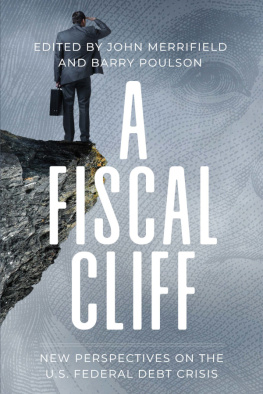Praise for Americas Fiscal Constitution
Something remarkable... a fascinating book about our economic history.... Americas Fiscal Constitution tells the story of how America has dealt with its debt since its founding, and in doing so provides a compelling roadmap to a more responsible fiscal future.
President Bill Clinton
Our nation cannot be strong militarily, diplomatically, or politically unless it is strong economically, and we cannot remain strong economically unless we deal with our massive debt burden.... A must read for those who believe that we should get our economic house in order.
James A. Baker, III, former Secretary of the Treasury and Secretary of State
In order to understand our fiscal plight, its crucial to appreciate how carefully America has dealt with debt in the past. Bill White makes that tale fascinating.
Walter Isaacson, bestselling author and former CEO of CNN and managing editor of Time magazine
Lucid and pioneering... a compelling and illuminating formula for both economic growth and fiscal restraint.
James MacGregor Burns, Pulitzer Prizewinning historian and Professor Emeritus at Williams College
There are few Americans I trust more than Bill White. With history as his guide, White trail-blazes through the Washington, DC, bureaucratic jungle, revealing Big Truths that are bolstered with Hard Facts.
Douglas Brinkley, professor at Rice University and CBS News historian
A thought-provoking and well-told history of our nations traditional financial principles. Every citizen can benefit from this books practical insights.
Ross Perot
Bill Whites thorough understanding of both finance and government allows him to trace the history of Americas path to the edge of fiscal irresponsibility.
Erskine Bowles, co-chairman of National Commission on Fiscal Responsibility
Powerful, penetrating and persuasive... a tour de force of our fiscal history. A timely and important contribution to the raging debate on our fiscal future.
Kent Conrad (D), former chairman of the US Senate Budget Committee
Our federal statutory debt is now larger than the entire American economy. This is unsustainable. Everyone needs to read this book... now.
Pete Domenici (R), former chairman of the US Senate Budget Committee



Copyright 2014 by Bill White
Published in the United States by PublicAffairs, a Member of the Perseus Books Group All rights reserved.
No part of this book may be reproduced in any manner whatsoever without written permission except in the case of brief quotations embodied in critical articles and reviews. For information, address PublicAffairs, 250 West 57th Street, 15th Floor, New York, NY 10107.
PublicAffairs books are available at special discounts for bulk purchases in the U.S. by corporations, institutions, and other organizations. For more information, please contact the Special Markets Department at the Perseus Books Group, 2300 Chestnut Street, Suite 200, Philadelphia, PA 19103, call (800) 810-4145, ext. 5000, or e-mail .
Book design by Trish Wilkinson
Set in 11-point Adobe Garamond Pro
Library of Congress Cataloging-in-Publication Data
White, William H., 1954
Americas fiscal constitution : its triumph and collapse / Bill White.
First edition.
pages cm
Includes bibliographical references and index.
ISBN 978-1-61039-344-7 (e-book)
1. Debts, PublicUnited StatesHistory. 2. BudgetUnited StatesHistory. 3. Fiscal policyUnited States. 4. United StatesAppropriations and expenditures. 5. United StatesEconomic policy2009 I. Title.
HJ8119.W45 2014
336.73dc23
2013042841
First Edition
10 9 8 7 6 5 4 3 2 1
To my parentsand others in their generationwho worked to create a brighter future for their children and limited federal debt for decades after World War II
CONTENTS
T HE ARCHITECT OF the written Constitution, James Madison, hoped that federal leaders would limit debt with principles that would be clearly visible to the naked eye of the ordinary politician. For almost two centuries ordinary American politicians followed well-defined principlesan unwritten fiscal constitutionto make budget decisions that now seem extraordinary. They incurred debt for only four well-defined purposes. That achievement appears more remarkable every year, as the federal government now lurches from one budget crisis to another.
The size and nature of federal borrowing changed when the nations traditional limits on debt collapsed at the beginning of the twenty-first century. Never before had the federal government waged major wars without raising taxes. Never before had it so heavily relied on foreign creditors. Never before had the president and Congress financed a permanent new domestic program entirely with debt. Never before had progressives accepted, much less insisted on, the substitution of federal debt for payroll contributions supporting the Social Security trust fund. Never before had many conservatives organized the fight against a constitutional amendment requiring a balanced budget. Never before had so many leaders of each major political party claimed that balancing the budgeteven with national income at an all-time highwould impair sustainable economic growth. After 2000 the federal government borrowed increasing amounts to pay for routine operating expenses in addition to debt incurred to pay for wars and recession-related stimulus.
The collapse of traditional budget practices occurred quietly, unaccompanied by some notable shift in public opinion or ideology. Americans did not wake up one morning and decide to mortgage their childrens future. No mandate to borrow arose from the photo-finish 2000 election. The federal government borrowed large amounts with a Republican president and Republican Congress, a Republican president and Democratic House, a Democratic president and Democratic Congress, and a Democratic president and Republican House.
The twenty-first century borrowing binge cannot simply be blamed on some defect in the character of federal elected officials. For two decades I have known our presidents and many congressional leaders in each party. They and others willing to endure the ordeal of elections care at least as much about their countrys future as do others who sit on the sidelines. In the 1990s, as a chief operating officer of a federal cabinet department, I found that leaders in both parties respected good faith efforts to balance budgets.
Next page
















